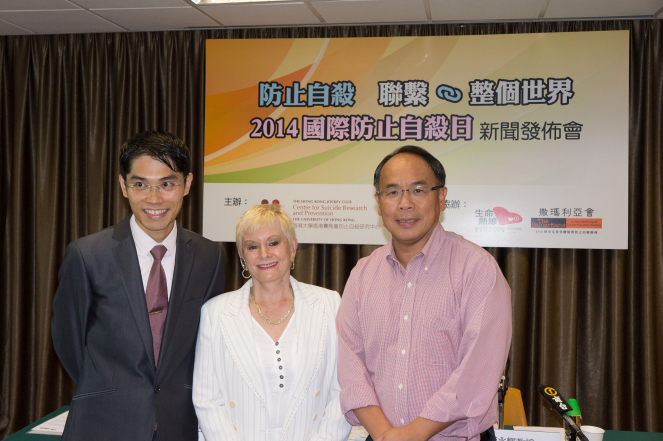Media
Suicide Prevention: One World Connected
10 Sep 2014
From left to right: Mr. Vincent Ng, Executive Director of Suicide Prevention Services, Ms. Liz Chamberlain, Chair of the board of the Samaritans and Professor Paul Yip, Director of the HKJC Centre for Suicide Research and Prevention, HKU .
In 2013, 12.3 out of 100,000 people have died by suicide in Hong Kong. The overall suicide rate has been dropping since 2003. However, the suicide rates are high among the older adults aged 60 or above (around 21.6 per 100,000 in 2013), which brings crucial challenges to our aging society. In comparison with figures in 2012, the recent moderate increase in suicidal attempts among females aged 15 to 24 and 25 to 39 are also worthy of our particular concern.
Today (September 10) is the World Suicide Prevention Day (WSPD). The theme of the year is 'Suicide Prevention: One World Connected'. The HKJC Centre for Suicide Research and Prevention (CSRP), HKU, collaborated with Suicide Prevention Services (SPS) and the Samaritans to hold a press conference in observance of the WSPD. They advocate policy makers and industrial associations to develop regulations and long-term strategy that urge various stakeholders to promote mental health as a multi-sectorial priority.
Disconnection as a risk factor
Professor Paul Yip, Director of the CSRP, emphasized that many suicides and mental problems are associated with disconnection, for example individuals are disconnected from social support, mental health care, or even withdraw from the society. A household survey in 2011 discovered that about 13% of the respondents aged above 60 were living alone and half of them seldom talked to their neighbors. Compared to other elderly respondents, this group reported a significant decrease in life satisfaction. Another recent study by the CSRP is concerned with the internet use among young people in Hong Kong. The telephone survey with 12- to 29-year-olds indicated about 1 to 3% of the respondents have been spending most of their time confined at home. They persistently avoid social situation and relationships for more than 6 months. This group of socially withdrawn youth reported lower level of psychological health and social-economic status, in comparison to their peers.
Challenges and opportunities in the Internet era
The same study on youth suggested that the long-term socially withdrawn youth prefer contacting others by instant messaging and expressing distress via online forums, rather than face-to-face approach. In this case, the new media is of great importance in connecting them with social support. Another study conducted by the CSRP observed that some online users were connected with harmful or pro-suicide information via the internet. The study found out that, in Taiwan during 2008 to 2011, every 10% increase in Google search of “burning charcoal” or “charcoal-burning suicide” in the present week was associated with a 3.8% increase in charcoal-burning suicide incidence in the following week.
Based on the research findings, Professor Yip urged policy makers and media industrial associations to develop regulations or practice codes that can timely connect people with social support. In this way, the public is also protected from pro-suicide or sensationalizing suicide information. He indicated that more and more professional organizations are developing new support services, engagement activities, intervention modules, and therapy programs, based on different media platforms. He hoped these services will be fully utilized in the future.
Connect disconnected
Mr. Vincent Ng, Executive Director of SPS, and Ms. Liz Chamberlain, Chair of the board of the Samaritans, introduced how their organizations reach out and engage disconnected people through various approaches. Besides hotline services, the SPS also provide regular home visit, telephone contact and seasonal visit/activities for elderly with emotional distress or suicidal risk. In addition, they offer individual counseling, mutual support groups and therapeutic programs to walk with the survivors in going through such bereavement journey. In order to identify and support distressed teenagers, they provide life education programs to schools, as well as offering comprehensive training to “gatekeepers” of teenagers – peers, parents, teachers, etc. The Samaritans provide not only multilingual hotline services but also a Befriending email service for people who prefer writing then talking. They also offer supporting group for suicide survivors.
About HKJC Centre for Suicide Research and Prevention (CSRP), HKU
Founded in 2002, the CSRP has been promoting the use of Public Health Approach in tackling suicide problems in Hong Kong. The CSRP has established its reputation in suicide research and prevention worldwide and extended its research scope to well-being of individuals as well as the whole society. The CSRP believes in that empirical research would optimize practices and ultimately contribute to the improvement of a society.
About Suicide Prevention Services (SPS)
Suicide Prevention Services (SPS) serves people who are suicidal, despairing or distressed by means of befriending and other services in supporting them to regain control of their emotions and the will to live on. We also aim at raising general awareness towards suicide and identifying ways in which suicide can be effectively addressed. Services include 24-hour Suicide Prevention Hotline, Suicide Prevention Service for the Elderly, Services for Survivors of Suicide Loss, Community & Life Education.
Hotline: 2382 0000
About the Samaritans, Hong Kong
The Samaritans is an independent, non-profit, non-religious organization established in 1974 for giving confidential emotional support to people who are suicidal or are in general distress regardless of their background and demographic attribute. Our 24-hour multilingual hotline services are operated by trained volunteers. In addition, we have a Befriending email service for people who prefer writing to talking. We also facilitate a monthly support group for survivors of suicide for mutual support and practical guidance on coping with grief. Hotline: 2896 0000 Befriending email: jo@samaritans.org.hk
For enquiry, please contact:
Mr. Rickey Yau. Tel: 2831 5232 Email︰csrp@hku.hk

